Email marketing remains one of the most effective strategies for businesses to engage with their audience, nurture leads, and drive sales. Among the plethora of tools available, HubSpot and Marketo stand out as two of the leading platforms in the market. Both offer comprehensive features that cater to a wide range of marketing needs, but choosing the right one for your business can be challenging. In this article, we will delve into a detailed comparison of HubSpot and Marketo, uncovering five hidden gem strategies that can enhance your email marketing efforts. Additionally, we will explore how innovative solutions like Prism Reach are reshaping the landscape with AI-powered personalization.
Key Facts: HubSpot vs Marketo
Before diving into the nuanced strategies, it’s essential to understand the foundational aspects of HubSpot and Marketo.
HubSpot
HubSpot is an all-in-one inbound marketing platform designed to help businesses attract visitors, convert leads, and close customers. It offers a user-friendly interface, making it accessible for businesses of all sizes, especially small to medium-sized enterprises. Key features include:
- Built-in Customer Relationship Management (CRM)
- Content Management System (CMS)
- Comprehensive email marketing tools
- SEO and content optimization tools
- Seamless integration with various third-party applications
Marketo
Marketo, owned by Adobe, is a robust marketing automation platform primarily geared towards larger enterprises with complex marketing needs. It offers advanced customization and scalability, making it a preferred choice for businesses that require sophisticated marketing strategies. Key features include:
- Advanced lead management and nurturing
- Extensive marketing automation capabilities
- Deep integration with Adobe Experience Cloud
- Comprehensive analytics and reporting
- Modular approach for focused learning and implementation
Detailed Comparison: HubSpot vs Marketo
Choosing between HubSpot and Marketo requires a thorough understanding of each platform’s strengths and how they align with your business needs. Below is an in-depth comparison across various critical aspects:
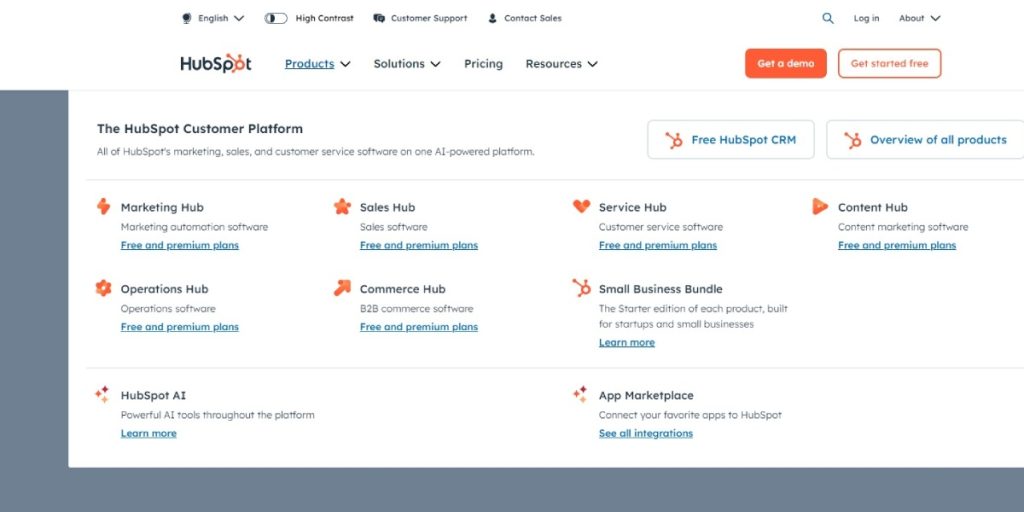
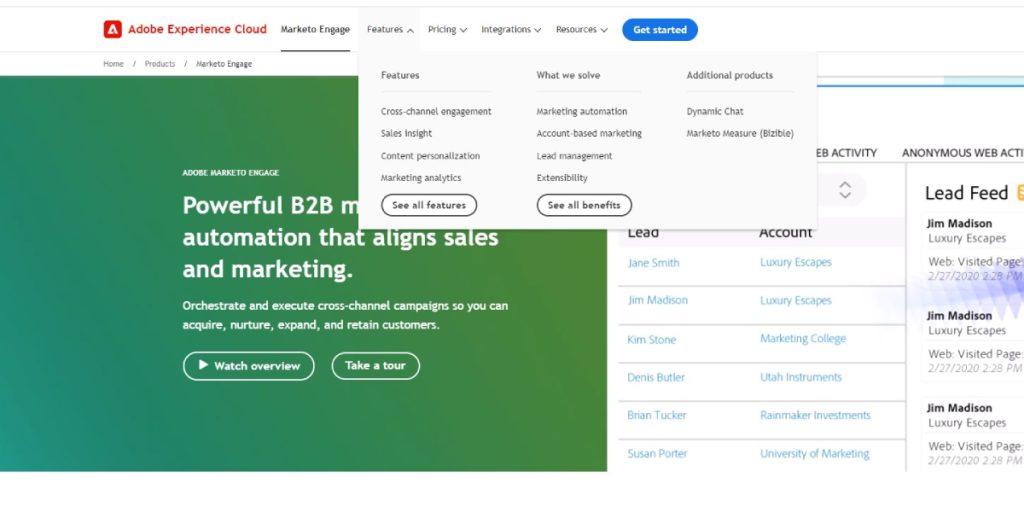
1. Ease of Use and User Interface
- HubSpot: Renowned for its intuitive and user-friendly interface, HubSpot allows users to navigate through its features with minimal training. The platform’s drag-and-drop editor and pre-built templates make it easy for marketers to create and manage campaigns without extensive technical knowledge.
- Marketo: While Marketo offers a powerful suite of tools, its interface is more complex and can be overwhelming for new users. It often requires more extensive training and a steeper learning curve, making it better suited for teams with dedicated marketing operations professionals.
2. Features and Capabilities
Analytics and Reporting: Marketo offers more advanced analytics and custom reporting options, catering to businesses that need detailed insights and data visualization. HubSpot provides comprehensive reporting as well, but its reports are generally more user-friendly and visually appealing, making them easier to interpret for a broader audience.
Email Marketing: Both platforms offer robust email marketing capabilities, including customizable templates, A/B testing, and automation. However, Marketo provides more advanced segmentation and targeting options, allowing for highly personalized campaigns.
Marketing Automation: Marketo excels in marketing automation with its extensive workflow capabilities and conditional logic, enabling complex automated campaigns. HubSpot also offers powerful automation but is generally more straightforward, making it easier to set up but potentially less flexible for intricate workflows.
CRM Integration: HubSpot comes with a built-in CRM, providing seamless integration between marketing and sales activities. Marketo requires integration with a separate CRM system, such as Salesforce, which can add complexity but also offers greater flexibility for businesses already using a preferred CRM.
3. Pricing and Value for Money
Value Proposition: HubSpot provides excellent value for small to medium-sized businesses due to its all-in-one approach and built-in CRM. Marketo offers superior value for large enterprises that require advanced marketing automation and integration capabilities.
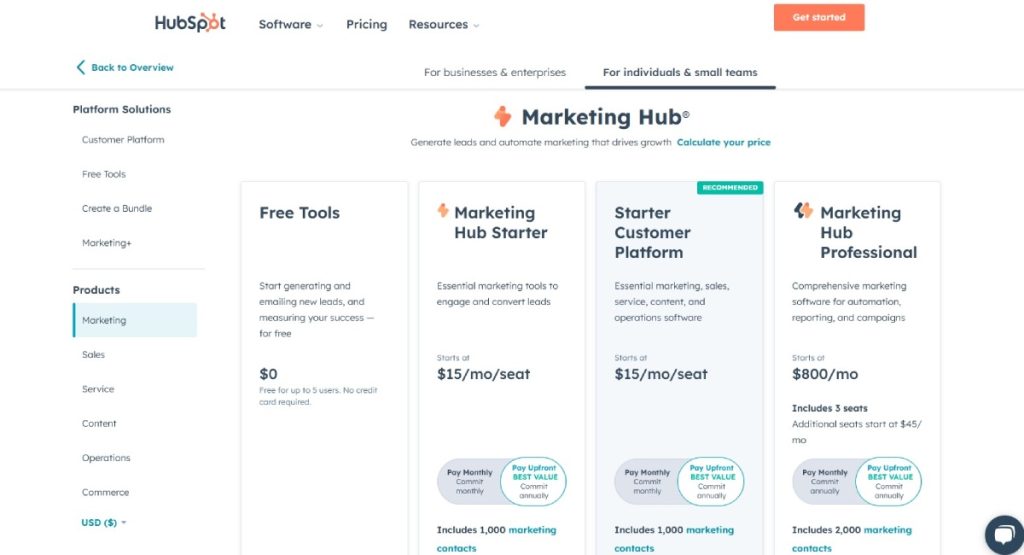
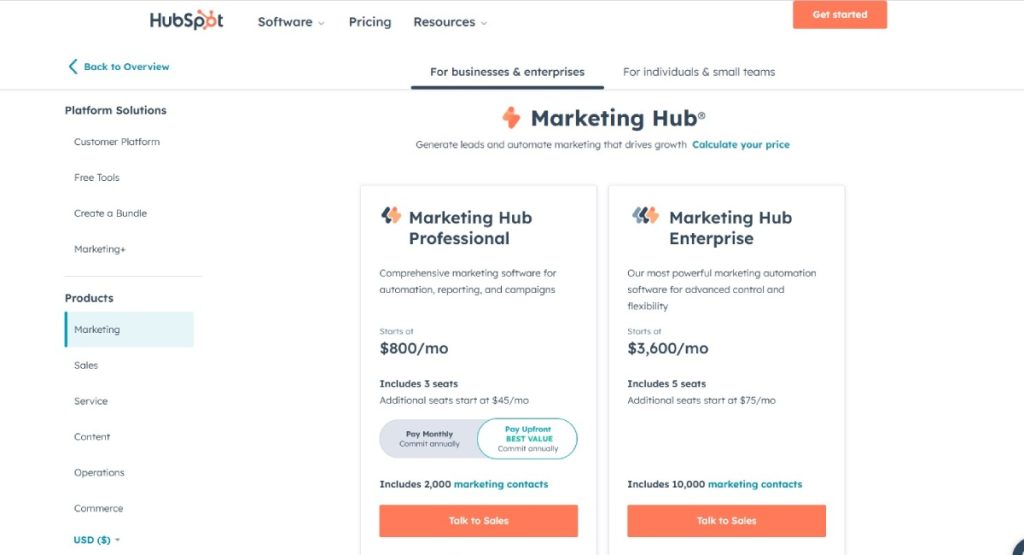
HubSpot: HubSpot offers a freemium model with tiered pricing plans, making it accessible for small businesses and scalable as your needs grow. Pricing is transparent, with clear feature delineations across different plans.
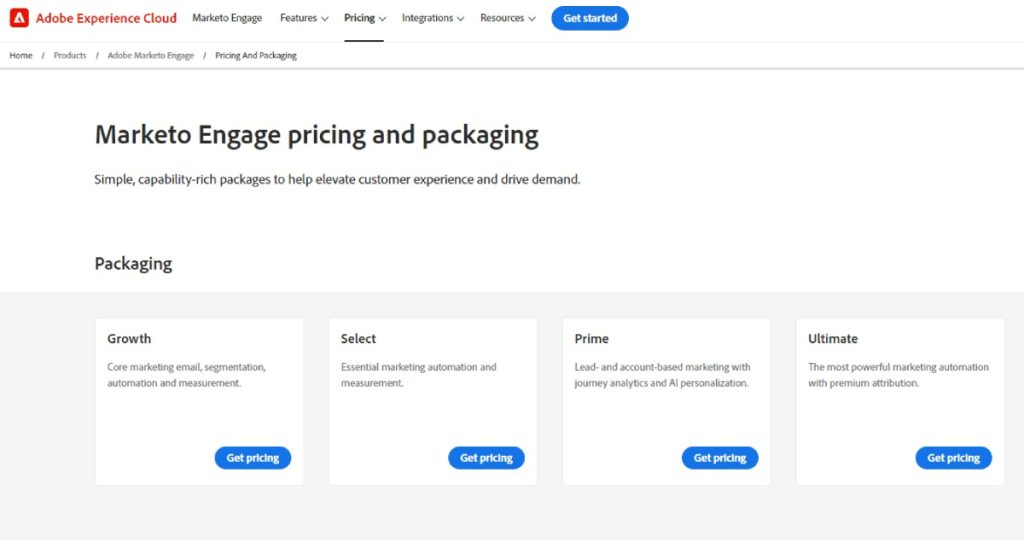
Marketo: Marketo’s pricing is generally higher and is based on the number of contacts in your database. It offers more flexibility in customizing pricing for enterprise-level clients, but the overall cost can be prohibitive for smaller businesses.
4. Integration and Ecosystem
- HubSpot: HubSpot boasts a vast ecosystem of integrations with various third-party applications, including CRM systems, social media platforms, and eCommerce tools. Its native integrations, particularly with its own CRM, provide a seamless experience for users.
- Marketo: Marketo offers deep integrations, especially with Adobe Experience Cloud, enhancing its capabilities for enterprises already utilizing Adobe’s suite of tools. Additionally, Marketo integrates with numerous other platforms, but the setup can be more complex compared to HubSpot.
- API and Customization: Both platforms offer robust APIs for custom integrations. Marketo’s API is highly flexible, catering to businesses with specific integration needs, while HubSpot’s API is user-friendly, facilitating easier integrations for those without extensive technical resources.
5. Customer Support and Resources
- HubSpot: HubSpot provides extensive customer support, including a comprehensive knowledge base, community forums, and dedicated support for higher-tier plans. Their HubSpot Academy offers free training resources, webinars, and certifications, empowering users to maximize the platform’s potential.
- Marketo: Marketo offers robust support options, including a detailed knowledge base, community forums, and dedicated account managers for enterprise clients. However, some users find Marketo’s support less accessible compared to HubSpot, particularly for smaller businesses.
- Training and Onboarding: HubSpot’s training resources are more accessible and user-friendly, making onboarding easier for new users. Marketo’s training is comprehensive but may require a more significant time investment to fully leverage its advanced features.
6. Scalability and Flexibility
- HubSpot: HubSpot is highly scalable, accommodating businesses as they grow from small startups to larger enterprises. Its modular pricing allows companies to add features as needed, ensuring that the platform remains relevant to evolving business needs.
- Marketo: Marketo is designed for scalability, particularly for large enterprises with complex marketing strategies. Its modular approach allows businesses to customize and expand their marketing automation capabilities as required, making it a robust solution for growing organizations.
- Flexibility: Marketo offers greater flexibility in creating highly customized marketing workflows and integrations, catering to businesses with specific and advanced marketing requirements. HubSpot, while flexible, is optimized for ease of use and may not offer the same depth of customization without additional technical resources.
Hidden Gems: 5 Effective Strategies for HubSpot vs Marketo
While both HubSpot and Marketo are feature-rich, there are lesser-known strategies within each platform that can significantly enhance your email marketing effectiveness. Here are five hidden gems to consider:
1. Leverage HubSpot’s SEO Keyword Tracker for Content Optimization
HubSpot’s built-in SEO tool allows you to tailor your content specifically for SEO purposes. By tracking relevant keywords, you can optimize your email content to improve organic search rankings, driving more traffic to your website and increasing the visibility of your campaigns.
2. Utilize Marketo’s “Certain” Event Platform Extension
For businesses heavily involved in events, Marketo’s “Certain” extension offers advanced management capabilities such as badges, check-in, and session tracking. This integration enhances event-related email campaigns by providing real-time data and personalized follow-ups based on attendee behavior.
3. Implement HubSpot’s Dynamic Sequences in Sales Hub
HubSpot’s dynamic sequences listen for key signals like web visits or email opens, enabling more targeted and timely sales outreach. By automating these sequences, your sales team can engage leads at the optimal moment, increasing the chances of conversion.
4. Exploit Marketo’s Modular Approach for Focused Learning
Marketo’s clearly defined modular structure, including Consumer Engagement and Marketing Automation modules, can be leveraged for more efficient onboarding and skill development. This modularity allows your team to master specific aspects of the platform without being overwhelmed by its extensive features.
5. Use HubSpot’s Data Quality Notifications in Operations Hub
Maintaining data integrity is crucial for effective email marketing. HubSpot’s data quality notifications in Operations Hub alert you to issues like duplicate data or anomalies, ensuring your database remains clean and reliable for targeted campaigns.
Integrating Prism Reach: Enhancing Email Marketing with AI
While HubSpot and Marketo offer robust email marketing solutions, innovative platforms like Prism Reach are pushing the boundaries of personalization and AI-driven marketing. Prism Reach leverages sophisticated AI algorithms to customize every aspect of newsletters based on subscriber behavior and preferences, providing a level of personalization that goes beyond traditional segmentation.
Benefits of Prism Reach
AI-Powered Personalization
Prism Reach revolutionizes email marketing through advanced AI algorithms that create detailed user avatars. These avatars are enriched with data from user behavior, engagement history, location, and predicted interests. This level of personalization ensures that each newsletter resonates deeply with individual subscribers, making content more engaging and impactful. Key aspects of AI-powered personalization include:
- Content Clustering: Proprietary AI models categorize content effectively for precise targeting.
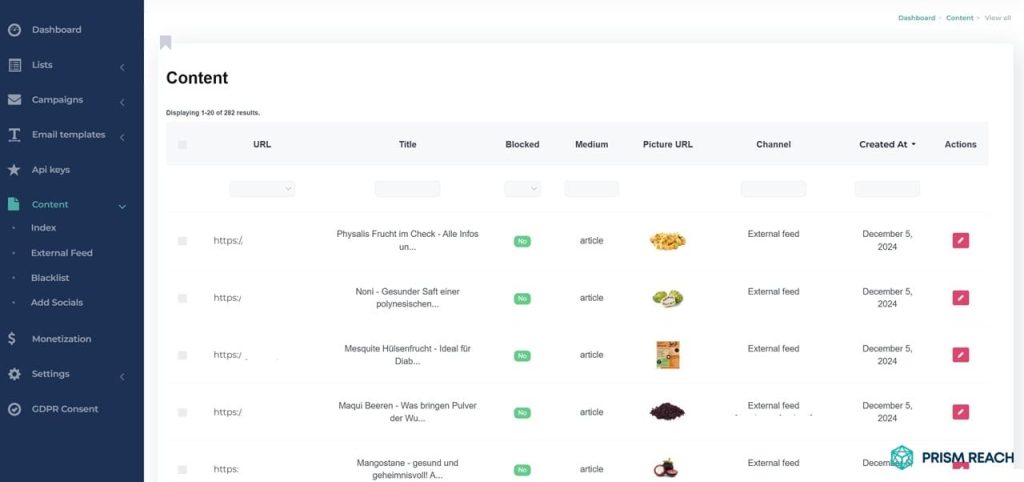
- User Avatars: Personalized profiles enhance the relevance of newsletters.
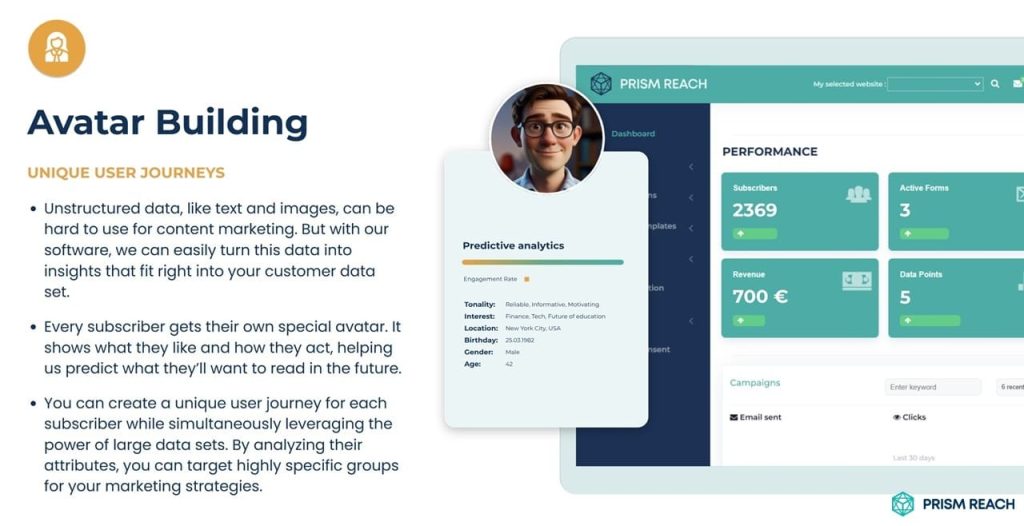
- Dynamic Introductions: Customized introduction paragraphs tailored to each subscriber.
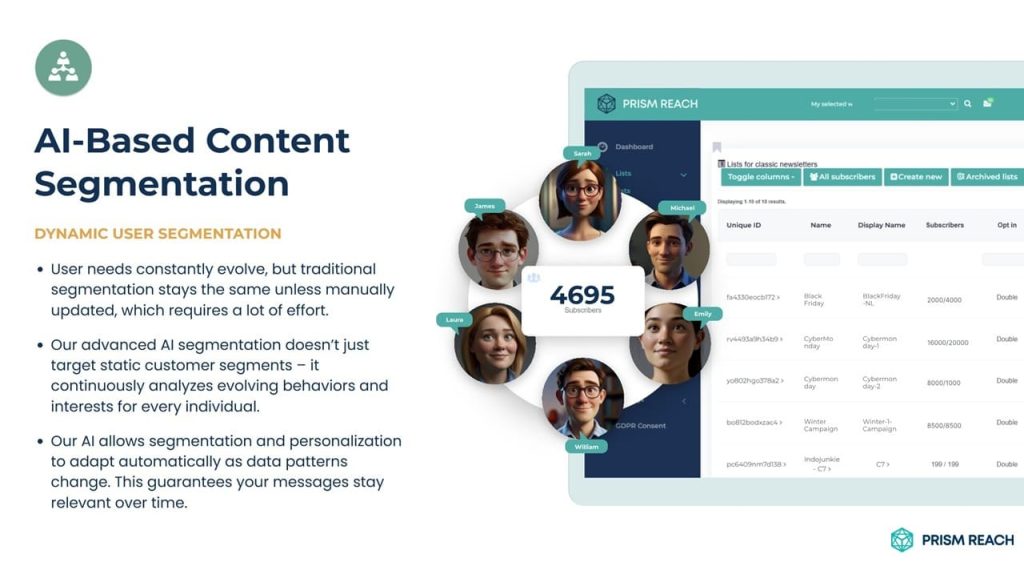
- Optimal Timing: Predictive analytics identify the best times to send emails for maximum engagement.
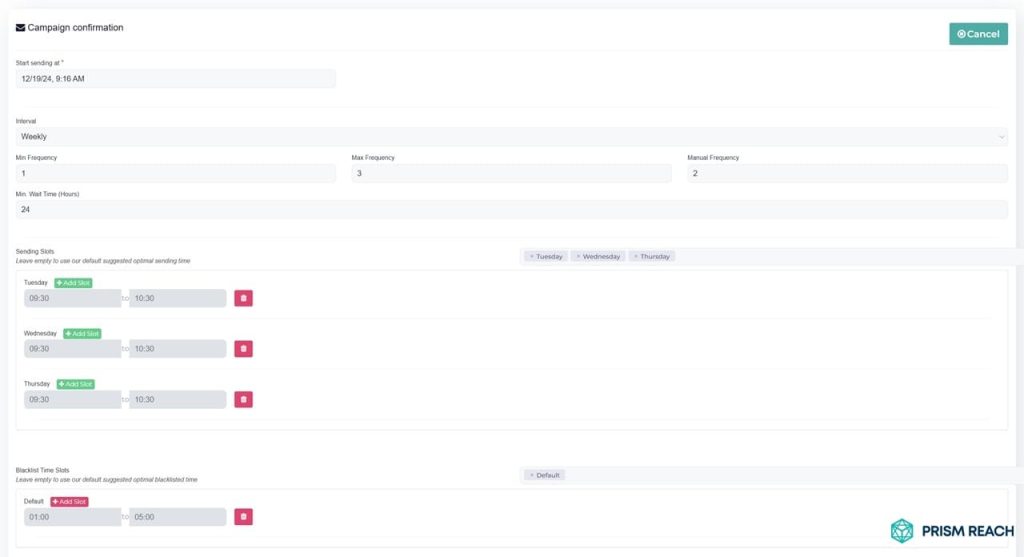
Seamless Setup and Integration
Prism Reach is designed for simplicity and efficiency, enabling businesses to quickly integrate the platform and leverage its capabilities.
- Quick Setup: The platform can be integrated within 10 minutes, allowing users to start creating personalized campaigns almost immediately.
- One-Click Uploads: Effortlessly migrate existing subscriber lists without technical hassles.
- AI-Enhanced Sign-Up Forms: These forms increase sign-up rates by dynamically generating content tailored to the user’s context, while improving GDPR compliance.
Dynamic Content Selection
Using advanced AI, Prism Reach selects the most relevant content for each subscriber based on their preferences and past interactions. This feature significantly enhances engagement rates and drives higher conversion rates by ensuring that every newsletter feels uniquely curated.
Advertising Network and Swap Network
Prism Reach includes tools that expand its functionality beyond email marketing:
- Targeted Advertising: A platform similar to major ad networks allows for precise ad placement based on subscriber data.
- Swap Network: Facilitates mutual promotion among publishers, broadening content reach and enhancing subscriber engagement.
Advanced AI Features
Prism Reach incorporates sophisticated AI capabilities to improve the effectiveness of email campaigns:
- Anti-Spam Checks: Ensures high deliverability rates and avoids spam filters.
- Enhanced Content Selection: Refines recommendations continuously for improved targeting.
Company and Product Overview
Prism Reach is an innovative AI-powered SaaS platform that enhances email marketing campaigns by leveraging deep personalization. Its core functionality lies in clustering website content and social media posts into relevant categories and using these insights to create tailored newsletters. By focusing on subscriber behavior and preferences, Prism Reach enables businesses to deliver highly effective campaigns with minimal effort.
Target Audience
Prism Reach is tailored for publishers and content creators, including:
- International media outlets.
- Blogs and forums.
- eCommerce businesses aiming to elevate digital marketing efforts and enhance customer engagement.
Key Features and Benefits
Increased Engagement
Subscribers respond better to content that aligns with their interests. Prism Reach delivers:
- Up to 40% Higher Engagement Rates: Personalized content significantly boosts interaction levels.
- Tailored Campaigns: Subscribers receive content that feels handpicked for them.
Higher Revenue
By personalizing newsletters and advertising, Prism Reach enables:
- Increased Monetization: Precise targeting drives higher ad performance.
- Improved Conversion Rates: Subscribers are more likely to act on tailored calls-to-action.
Improved Productivity
Automation powered by AI reduces the workload on marketing teams:
- Efficient Campaign Management: Create and deploy personalized newsletters faster.
- Streamlined Processes: Automated content clustering and selection save time.
User Journey
The typical user journey with Prism Reach involves:
- Sign-Up: Subscribers join through an AI-enhanced form tailored to their preferences.
- Interest Selection: Users specify areas of interest to guide content personalization.
- Newsletter Delivery: Subscribers receive dynamically personalized newsletters that cater to their preferences, leading to higher satisfaction and retention rates.
Compliance and Data Privacy
Prism Reach prioritizes data protection and compliance:
- GDPR Compliance: AI-enhanced sign-up forms improve adherence to regulations.
- Secure Hosting: Data is hosted within Europe, ensuring compliance with strict privacy standards.
Future Prospects
Prism Reach aims to expand its capabilities to include:
- Continuous Innovation: Ongoing improvements to AI algorithms ensure the platform remains at the forefront of marketing technology.
- eCommerce Integration: Bringing the power of AI-driven personalization to online retail.
- Broader Marketing Applications: Leveraging AI for diverse marketing challenges.
Practical Tips for Effective Email Marketing
To maximize the effectiveness of your email marketing campaigns, consider the following practical tips:
1. Choose the Right Platform Based on Your Business Needs
- HubSpot: Ideal for small to medium-sized businesses looking for an all-in-one solution with built-in CRM and user-friendly interface.
- Marketo: Best suited for larger enterprises that require advanced customization, scalability, and integration with Adobe Experience Cloud.
- Prism Reach: Perfect for businesses seeking hyper-personalization and AI-driven content optimization to enhance subscriber engagement.
2. Utilize Hidden Gems to Enhance Your Strategy
- Implement dynamic sequences in HubSpot to engage leads at the right moment.
- Use Marketo’s “Certain” extension for sophisticated event management and personalized follow-ups.
- Leverage HubSpot’s data quality notifications to maintain a clean and reliable database.
3. Embrace AI and Automation for Personalization
Platforms like Prism Reach offer advanced AI capabilities that allow for deep personalization. By analyzing subscriber behavior and preferences, AI can tailor content to individual needs, significantly improving engagement and conversion rates.
How Prism Reach Enhances HubSpot and Marketo Campaigns
Prism Reach seamlessly integrates with HubSpot and Marketo, enhancing their capabilities through advanced AI-driven features. Here’s how:
1. Enhanced Personalization
While HubSpot and Marketo offer personalization features, Prism Reach takes it a step further by creating detailed user avatars and dynamically adjusting content based on real-time data. This ensures that each subscriber receives content that is highly relevant to their interests and behaviors.
2. Improved Engagement Metrics
By utilizing Prism Reach’s AI-powered content optimization, businesses can achieve higher open and click-through rates. The platform’s ability to determine optimal sending times and personalize introductions increases the likelihood of subscriber engagement.
3. Streamlined Campaign Management
Prism Reach’s seamless setup and integration capabilities reduce the time and effort required to manage email campaigns. With one-click uploads and AI-enhanced sign-up forms, businesses can efficiently migrate existing lists and enhance their email marketing strategies without extensive technical resources.
Upgrade Your Email Marketing with AI Personalization!
FAQ
Conclusion
In the battle between HubSpot and Marketo, there’s no clear-cut winner. The choice ultimately depends on your business size, technical resources, and specific marketing needs. HubSpot shines with its user-friendly interface, integrated CRM, and cost-effectiveness, making it an excellent choice for small to medium-sized businesses. On the other hand, Marketo, with its advanced customization options and enterprise-level capabilities, is better suited for larger organizations with complex marketing requirements.
As the email marketing landscape continues to evolve, innovative solutions like Prism Reach are introducing new possibilities for hyper-personalization and AI-driven marketing. By integrating Prism Reach with your chosen platform, you can enhance your email marketing campaigns, achieve higher engagement rates, and foster stronger relationships with your subscribers. Whether you choose HubSpot, Marketo, or a combination with Prism Reach, focusing on personalized and data-driven strategies will be key to your email marketing success.